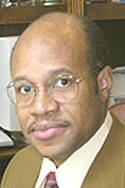Truthiness and the War on Christmas
Recently a friend emailed me what he described as an excerpt from the CBS morning show several years ago.

|
| Dr. Errington Thompson |
This is not the first time I’ve been sent this diatribe and it won’t be the last. It talks about the “War on Christmas” and how Ben Stein, the commentator, does not mind Christmas trees and other accoutrements of Christmas. Here’s what Stein said:
“I am a Jew, and every single one of my ancestors was Jewish. And it does not bother me even a little bit when people call those beautiful lit-up, be jeweled trees Christmas trees. I don’t feel threatened. I don’t feel discriminated against. That’s what they are: Christmas trees.
“It doesn’t bother me
a bit when people say, ‘Merry Christmas’ to me. I don’t think they are
slighting me or getting ready to put me in a ghetto. In fact, I kind of
like it. It shows that we are all brothers and sisters celebrating this
happy time of year. It doesn’t bother me at all that there is a manger
scene on display at a key intersection near my beach house in Malibu.
If people want a crèche, it’s just as fine with me as is the Menorah a
few hundred yards away.
“I don’t like getting pushed around for being a Jew, and I don’t think
Christians like getting pushed around for being Christians. I think
people who believe in God are sick and tired of getting pushed around,
period. I have no idea where the concept came from that America is an
explicitly atheist country. I can’t find it in the Constitution and I
don’t like it being shoved down my throat.”
Okay, here’s the problem, there is no war on Christmas. This problem,
this confrontation, is completely made up. You and I have been able to
celebrate Christmas or Hanukkah or Kwanzaa or whatever holiday you want
to celebrate in whatever way we want it to celebrate it — as long as it
didn’t involve injuring another person or infringing on another
person’s rights. I’ve been able to place a 10-foot tree or a 20-foot
tree in my house, and I’ve been able to place as many lights or as few
lights as I wanted to on it. I’ve been able to top the tree with a star
or a cross, or put nothing on top, without a peep from the neighbors. Now, if I wanted to sacrifice my neighbor’s dog or his cat, that would
pose a problem.
This phony “war” on Christmas is sponsored by the same people who keep
trying to convince us that we live in a Christian nation. Now, most of
our founding fathers were thoughtful, well educated, enlightened men —
products of the Enlightenment. And, in fact, many of them were also
very religious. So let’s investigate our early documents to see if we
can find some evidence of this “Christian” nation. Let’s look first at
the opening paragraph of the Declaration of Independence, which was
drafted in July of 1776:
When in the Course of human events, it becomes necessary for one people
to dissolve the political bands which have connected them with another,
and to assume among the powers of the earth, the separate and equal
station to which the Laws of Nature and of Nature’s God entitle them, a
decent respect to the opinions of mankind requires that they should
declare the causes which impel them to the separation.
“We hold these truths to be self-evident, that all men are created
equal, that they are endowed by their Creator with certain inalienable
rights. . .” And there you have it. In the first two paragraphs of one
of our founding documents, the founders have twice mentioned God, the
Creator.
But… the Declaration of Independence was not, and is not, one of our
governing documents; it was a letter of protest to the King of England.
And while religious in tone, it’s not specifically Christian. Remember,
there’s a big difference between being a religious people and being a
Christian nation. After all, Jews, Muslims, pagans, and pantheists are
all religious people, but none of them can be called Christian. What
matters is what governs us as a nation. So let’s look at our governing
documents.
The first governing document was the Articles of Confederation, also
drafted in 1776, not long after the Declaration. The Articles are the
forefather of our Constitution, and in the thirteenth Article is found
this clear reference to God: “And Whereas it hath pleased the Great
Governor of the World to incline the hearts of the legislatures we
respectively represent in Congress, to approve of, and to authorize us
to ratify the said Articles of Confederation and perpetual Union.”
But the Articles turned out to be a failure. Between the time they were
adopted and the time they were scrapped, the fledgling nation learned a
great deal about self-government. Among the Articles’ flaws were that
the relationships between the states, and between the states and the
nation, were not well defined. And, in reaction to the tyranny of King
George, the Articles went out of their way to weaken the central
government. By 1787, the experience of trying to fight and fund a war
against England without a strong central government led the founders to
toss out the Articles of Confederation in favor of a new governing
document, the Constitution of the United States.
The Constitution is a beautiful, elegant document. The framers
anticipated many of the problems that we’ve experienced over the last
220 years. They ensured an independent judicial branch, they separated
powers, they developed a system of checks and balances. Remarkably, the
phrase “the great Governor,” “God,” or “Supreme Being,” cannot be found
anywhere in the document. On the contrary, Article Six contains the
clear disclaimer that “no religious test shall ever be required as a
qualification to any office or public trust under the United States.”
When the Constitution was drafted, the state constitutions of 11 of the
13 original states included religious tests to hold office. An
examination of these religious requirements makes it clear why the
Constitution was written the way it was. Rhode Island, a very liberal
state and religiously open, required that you must be a Protestant to
hold office. In Pennsylvania, not only did you need to be a Protestant,
but you also had to believe in the “divine inspiration of the old and
new Testaments.” Just think about how many good Americans would be
excluded from public office on the basis of those religious tests.
As every high school student is taught, the Federalist papers were
written by James Madison, Alexander Hamilton, and John Jay to explain
and convince the New York delegation to ratify the Constitution. James
Madison argues in Federalist #10 that religious decrees cannot lead men
to “cooperate for their common good.” Instead, he explains, such
decrees dispose men “to vex and oppress each other.”
To test the validity of Madison’s premise, look at religious states
around the world today. Are they places where ideas flourish and
citizens are able to think for themselves? Think of Saudi Arabia or the
Sudan when you think of a “religious state.”
Recently a British teacher was convicted in Sudan of insulting Islam by
allowing her students to name a teddy bear Mohammed, taken as a
reference to Islam’s prophet and founder.” She was sentenced to two
weeks in jail, but crowds in the street demonstrated to have her
executed. (Under international pressure, she was pardoned and released
on December 3.)
In Saudi Arabia a court doubled, to 200 lashes, the sentence of a
19-year-old rape victim because she “attempt(ed) to aggravate and
influence the judiciary through the media.” She was to be punished in
the first place because she had been in a car with a man who was not
her kin, and that behavior supposedly justified her rape.
All of this discussion brings me back to the “War on Christmas,” a
bogus idea conceived as a wedge issue by right-wing think-tank
ideologues. (Whenever you see a study by the Cato Institute or American
Enterprise Institute, think of it as propaganda, not information.)
Their attempt to impose Christianity on all Americans is a perfect
example of Madison’s premise: “to vex and oppress each other.”
The fact is that our government may not support one religion over
another, and that prohibition extends to state and local governments as
well. The city and county can honor and recognize holidays, but
government may not use its power — or your tax money — to celebrate my
particular “holy day,” or tax me to celebrate yours.
Private businesses, however, are free to celebrate whatever they wish,
including displays of Christmas trees and crèches, Menorahs, Kwanzaa
displays, or ancient Yule logs. Many store owners believe that some
Americans — some of their customers — might be offended by religious
displays, and if they decide to remove or alter their own display, they
make that choice for themselves. On the other hand, most Americans
understand that their relationship with God doesn’t depend on what a
store displays, and their choice whether or not to shop at a particular
store isn’t based on the owner’s faith.
My religious book, the Bible, tells me to love God above all else, and
to love my neighbor. It warns against idol worship. So, I’m trying to
love my neighbor (Democrat or Republican, or unaffiliated, quiet or
loud, intelligent or challenged, truthful or those that believe in
truthiness.) All of them.
Let me now wish you “Happy Holidays and Merry Christmas.” And I say it
freely because I’m a private citizen, not a state or city (although I’m
getting fatter and may need my own zip code soon!)
Dr. Errington C. Thompson is a surgeon, scholar, author, part-time political activist and full-time sports fan. He is active in a number of community projects and initiatives. Dr. Thompson is currently a critical care/trauma surgeon at Mission Hospital.








